Obsessive-compulsive disorder (OCD) is a type of anxiety disorder that causes obsessions (illogical, irrational, and baseless thoughts) and compulsive (repetitive) behaviors, often disrupting one’s life.
The good news is that this mental health condition is usually treatable with a combination of anti-anxiety medication, psychotherapy, and lifestyle changes.
In conjunction with your child’s prescribed treatment plan, avoiding certain foods and consuming healthy foods may help control OCD symptoms.
Table of Contents
- Foods that Your Child with OCD Should Avoid
- Candy, Pastries, Cookies, Soda, & Other Sugary Treats
- Milk Chocolate, Soda, Coffee, Black and Green Tea & Other Caffeinated Foods
- Liquor, Beer, Wine & Other Alcoholic Beverages
- Pizza, Hamburgers, Fries & Other Processed Foods
- Donuts, Chips & Other Trans & Saturated Fats
- Wheat Bread, Cornbread, Canned Soups & Other Gluten-Based Foods
- Food Additives & Preservatives (Aspartame, High Fructose Corn Syrup, Food Dyes & MSG)
- In Summary…
Foods that Your Child with OCD Should Avoid
Listed below are foods that your child with OCD should avoid:

All of my young clients with OCD love sugary treats. This isn’t unusual because most children, in general, love sugary treats like candy, soda, pastries, cookies, etc.
However, it’s important to limit your child’s consumption of these delicious treats if he/she has OCD. Why? Well, because refined sugars will raise your child’s glucose (blood sugar) level, leading to a temporary “high.”
Temporary meaning that within a short time, the level decreases, leaving mood swings and sluggishness in its wake.[1]
For some children, the “sugar high” triggers OCD symptoms. In fact, some children experience increased irritability, anxiety, mood swings, depression, and OCD symptoms, once the “high” has worn off (the crash). [1]
Therefore, sugary foods like candy, soda, cookies, and pastries can cause or worsen anxiety in some children. This is especially true for children who are hypersensitive to sugar.
So, it is important for children with OCD and other anxiety disorders to keep their glucose level as normal as possible by consuming healthy foods like fruits, veggies, whole grains, lean meats, healthy fats, and low-fat dairy products. (1)
Milk Chocolate, Soda, Coffee, Black and Green Tea & Other Caffeinated Foods

The thing that my teen clients with OCD hate the most is giving up caffeinated foods like milk chocolate, soda, coffee and tea – just to name a few. Most children, young or old, love chocolate. The young ones love chocolate chip cookies and chocolate milk, while the teens love soda, tea, and coffee.
Note: Since coffee isn’t the best thing for your child or teen to be drinking because of its stimulant properties, exercise caution if you decide to give it to him/her anyways.
There is always a look of dread when I suggest to the parents of my young clients with OCD that they limit or eliminate caffeinated foods and beverages from their children’s diets. But, I do it anyways, because there is a chance it could help ease their OCD symptoms.
Caffeine is a stimulant that affects your child’s central nervous system, which means that even though it boosts energy and sharpens focus and concentration, it can also trigger or exacerbate anxiety symptoms. [1]
So, if your child or teen has OCD, you may want to consider weaning them down to approximately 100mg or less per day of it – that is, if he/she refuses to let go of the caffeine altogether. [2]
Furthermore, if your child is a caffeine-addict, replace their caffeinated teas and coffee with herbal teas, their milk chocolate with pure dark chocolate, and their sodas with soda water with a touch of flavor, all of which are healthy for your child’s body and mind.
Liquor, Beer, Wine & Other Alcoholic Beverages

Note: It is against the law, in the US, to provide minors under the age of 21 with alcohol. Still, I added this category to the list because it is common for teens to indulge in alcoholic beverages without their parents’ consent or knowledge.
Unlike caffeinated foods and beverages that boosts your child’s energy; alcohol “slows” them down. [1] More specifically, while caffeine is a “stimulant,” alcohol is a “depressant.”
And, even though alcohol relaxes the body temporarily, once the “buzz” wears off; the anxiety comes raging back. [1] As a result, your child’s OCD symptoms may worsen instead of easing.
Liquor, beer, wine, and other alcoholic beverages can also cause serious psychological side-effects, a dip in blood sugar, and insomnia, all of which can intensify OCD symptoms. [1] Furthermore, alcohol can interact with anti-anxiety meds, lessening their effects and causing excessive drowsiness and sleepiness. [1]
Sadly, many teens with OCD abuse drugs and alcohol, so if you suspect that your child is drinking alcohol under the age of 21, or doing illegal drugs, consult his/her doctor as soon as possible.
Pizza, Hamburgers, Fries & Other Processed Foods
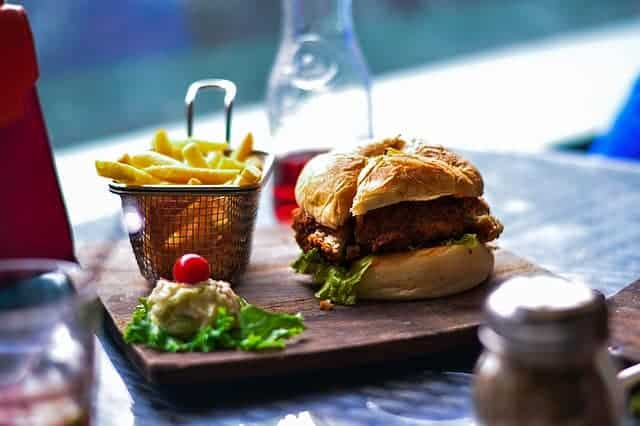
Another food group that my young clients with OCD hate to give up is processed foods like pizza, hamburgers, and fries. Everyone loves “junk foods” like the ones listed above, but no one loves them more than children.
However, when the parents of my young clients limit or prohibit these foods from being in the house, there is a remarkable reduction in their children’s OCD symptoms.
Removing processed foods from your child’s diet can only help their overall health. Processed foods are loaded with dyes, preservatives, sodium, and sugar – so basically nothing good.
And, because they are chock full of these bad things, they cause your child to retain fluid (sodium retention), they add on unnecessary and unwanted pounds, they trigger inflammation, and cause bodily stress.
Keep in mind that many processed foods contain a form of sodium called MSG. [3] Other processed foods to look out for are soups, salad dressings, frozen dinners, and fast food, of course.
These unhealthy foods can cause nervousness, chronic illnesses, and mental health conditions like depression, anxiety, OCD, etc.
In fact, a 2017 OCD study, published in JAMA Psychiatry, found that individuals with OCD had a higher level of brain inflammation than their non-OCD counterparts. [4] This is especially true of those who consume processed foods on a regular basis. [4]
Therefore, it is extremely important that you limit or restrict your child’s consumption of processed “junk” foods. Foods from places like Whole Foods and Fresh Market are a good alternative.
Donuts, Chips & Other Trans & Saturated Fats

Trans and saturated fats may be making your child’s OCD worse. Like saturated fat, trans fat (also known as hydrogenated fat) is an “unhealthy” fat, not just for your child’s physical health, but also for their mental health. These unhealthy fats can wreak havoc on your child’s mood.
In fact, researchers have found that trans and saturated fats (like the ones found in donuts, chips, cakes, fries, deli meats, whipped cream, whole milk, milk chocolate, butter, fatty meats, and packaged food items) increase your child’s risk of anxiety and depression. [5]
Furthermore, a 2014 study on Trans fat, conducted on mice and published in the International Journal of Food Sciences and Nutrition, found that sustained consumption of trans fat can lead to anxiety in some people. [5]
So, the next time you’re at the grocery store, you may want to consider stocking up on healthy snacks like Greek yogurt, Swiss cheese sticks, celery and low-fat veggie dip, baked veggie chips, and/or apple slices with low-fat caramel sauce.
Wheat Bread, Cornbread, Canned Soups & Other Gluten-Based Foods
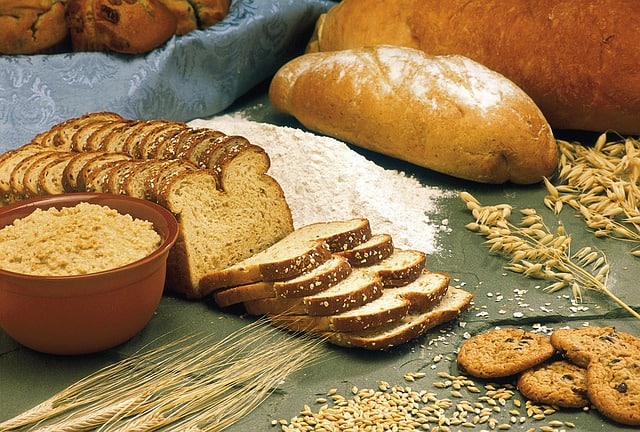
I often recommend that parents of children with OCD avoid foods rich in gluten in the hope that it will ease their children’s OCD symptoms. Researchers have found that gluten triggers anxiety and panic attacks in some individuals. [6]
Therefore, avoiding or reducing your child’s consumption of foods that contain gluten may improve his/her mental health.
In fact, a 2012 study on the relationship between gluten and anxiety, published in the Psychiatric Quarterly, found that people with OCD tend to feel more anxious after consuming gluten than those who do not consume foods that contain gluten. [6]
So, instead of feeding your child foods that contain wheat, like salad dressings, cornbread, flavored potato chips, cereals, sour cream, mayonnaise, mustard, deli meats, canned soups, and pasta, use gluten-free foods (i.e. buckwheat, nut flours, fruits and veggies, lean meats, fish, skim or low-fat milk, yogurt, some cheeses, rice, etc.) and prepare snacks and food products at home. [7], [8]
Food Additives & Preservatives (Aspartame, High Fructose Corn Syrup, Food Dyes & MSG)

Many people I counsel, both young and “seasoned,” don’t realize how much damage food additives and preservatives can do to the human body. And, many report that they feel much better, physically and mentally, once they remove these man-made “ food enhancers” from their diets.
The purpose of additives is to make food taste better, and the purpose of preservatives is to preserve food for as long as possible. However, these chemicals are very unhealthy for your child, especially if he/she has an anxiety condition like OCD.
Food additives and preservatives can trigger or worsen anxiety by increasing the inflammation in your child’s body. [9] Increased inflammation can lead to anxiety in some people.
Some of the most common “hidden” food additives and preservatives are aspartame (an artificial sugar commonly found in diet foods), high fructose corn syrup (often found in packaged sweets and processed foods), MSG (a harmful “flavor enhancer” often found in deli meats, Chinese food, soups, salad dressings, packaged snack foods, and frozen foods like frozen pizza and fries), and food dyes (often found in sodas, salad dressings, fruit juices, and some cheeses). [9]
It is important to note that certain food dyes (i.e. Red #40 & Yellow #5) can interrupt your child’s nervous system function, triggering or aggravating OCD symptoms. [9]
Therefore, replace most, if not all, of the packaged and frozen food products in your home with fresh, dye-free foods (i.e. lean meats, fruits, and veggies) and if possible, opt for the organic ones. [9]
In Summary…
If your child is struggling with OCD, they probably feel “on edge” most of the time. According to the Anxiety and Depression Association of America, the average age of onset for OCD is 19; however, approximately 25% of people with this condition are diagnosed with it before they reach 14 years old. [10]
Furthermore, approximately 33% of adults with OCD report that their symptoms first began during childhood. [10]
It is important to note that 2.2 adults, in the US, currently suffer from OCD with its prevalence being the same for women and men. [10] The good news is that this condition can be managed with the proper treatment (i.e. anti-anxiety meds, psychotherapy, a healthy diet, and/or regular exercise).
Unfortunately, only 37% of those with an anxiety disorder like OCD seek treatment for it. [10]
Keep in mind that consuming certain foods may stabilize your child’s central nervous system (the part of the body that regulates cognitive functions, controls emotions like: happiness, sadness, anxiety, etc., and initiates behavior) and lessen their OCD symptoms, while consuming other foods may lead to stress and anxiety, thus increasing OCD symptoms.
Although studies on the relationship between foods and mental health conditions (like OCD) are currently limited, a healthy diet with plenty of nutritious foods will provide your child with a strong immune system and a healthy body and mind, so they can banish OCD from their life for good!
References:
- Bhandari, S. (2017). Foods to avoid if you have anxiety or depression. WebMD.
- Bourne, E. (2015). The anxiety and phobia workbook paperback. Oakland, California. New Harbinger Publications.
- Orenstein, B. W. (2018). 9 foods that help or hurt anxiety. Everyday Health.
- Attwells, S., Setiawan, E., Wilson, A. A., et al. (2017). Inflammation in the neurocircuitry of obsessive-compulsive disorder. JAMA Psychiatry, 74(8), 833–840.
- Pase, C. S., Teixeira, A. M., Dias, V. T., Quatrin, A., Emanuelli, T. & Bürger, M. E. (2014). Prolonged consumption of trans fat favors the development of orofacial dyskinesia and anxiety-like symptoms in older rats. International Journal of Food Sciences and Nutrition, 65(6), 713-719.
- Jackson, J. R., Eaton, W. W., Cascella, N. G. et al. (2012). Neurologic and Psychiatric Manifestations of Celiac Disease and Gluten Sensitivity. Psychiatric Quarterly, 83(1), 91-102.
- Celiac Disease Foundation. (2018). Sources of gluten.
- Gluten-Free Society. (2018). Guidelines for avoiding gluten.
- Page, A. (2018). 8 food additives sabotaging your mood. Health Central.
- Anxiety and Depression Association of America. (2018). Anxiety: Facts & statistics.

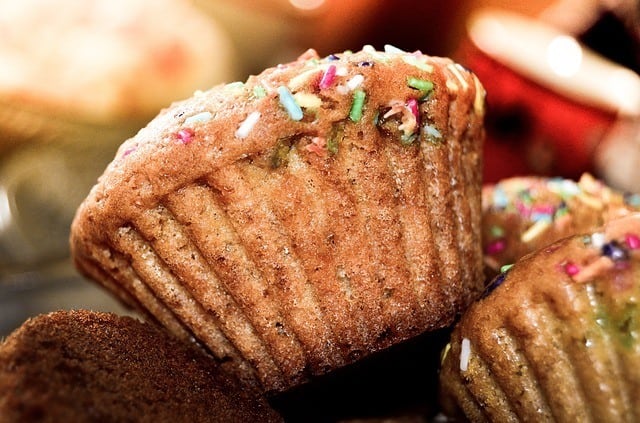
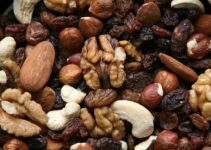






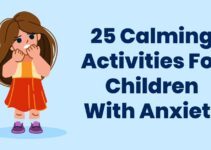

The article is great except for demonizing saturated fat which is very much needed for brain health. See the work of Dr. Weston A. Price for more info in this area.
What’s a good sugar alternative?
Is Monk Fruit safe ?
I have a 10 year old with severe Anxiety and OCD